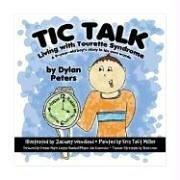Tic Talk
A documentary film about living with Tourette syndrome
Tic Talk: Living with Tourette Syndrome is a documentary film that explores the lives of individuals affected by Tourette syndrome, a neurological disorder characterized by repetitive, involuntary movements and vocalizations called tics. The film provides an in-depth look at the challenges and triumphs faced by those living with the condition, aiming to raise awareness and understanding among the general public.
Overview[edit | edit source]
The documentary "Tic Talk" delves into the personal stories of several individuals diagnosed with Tourette syndrome. Through interviews and personal narratives, the film highlights the diverse experiences of those living with the disorder, showcasing both the difficulties and the resilience of the individuals and their families.
The film aims to dispel common myths and misconceptions about Tourette syndrome, emphasizing that it is not solely characterized by the vocal tics often portrayed in media. Instead, "Tic Talk" presents a nuanced view of the condition, illustrating the wide range of symptoms and the impact on daily life.
Content[edit | edit source]
The documentary is structured around several key themes:
Understanding Tourette Syndrome[edit | edit source]
The film begins by explaining the medical and neurological basis of Tourette syndrome. It provides an overview of the nervous system and how it is affected in individuals with the disorder. The documentary also discusses the genetic and environmental factors that may contribute to the development of Tourette syndrome.
Personal Stories[edit | edit source]
A significant portion of "Tic Talk" is dedicated to the personal stories of those living with Tourette syndrome. These narratives provide insight into the daily challenges faced by individuals, such as managing tics in social situations, dealing with stigma, and navigating the education system.
Coping Strategies[edit | edit source]
The film also explores various coping strategies and treatments available for managing Tourette syndrome. It discusses the role of behavioral therapy, medication, and support groups in helping individuals lead fulfilling lives. The documentary highlights the importance of a supportive environment and the role of family and friends in the lives of those affected.
Raising Awareness[edit | edit source]
"Tic Talk" emphasizes the need for increased awareness and understanding of Tourette syndrome. It calls for greater acceptance and inclusion of individuals with the disorder in all aspects of society. The film encourages viewers to challenge stereotypes and support efforts to improve the quality of life for those with Tourette syndrome.
Impact[edit | edit source]
Since its release, "Tic Talk: Living with Tourette Syndrome" has been used as an educational tool in schools, medical institutions, and community organizations. It has been praised for its empathetic portrayal of individuals with Tourette syndrome and its contribution to raising awareness about the condition.
Related pages[edit | edit source]
Search WikiMD
Ad.Tired of being Overweight? Try W8MD's physician weight loss program.
Semaglutide (Ozempic / Wegovy and Tirzepatide (Mounjaro / Zepbound) available.
Advertise on WikiMD
|
WikiMD's Wellness Encyclopedia |
| Let Food Be Thy Medicine Medicine Thy Food - Hippocrates |
Translate this page: - East Asian
中文,
日本,
한국어,
South Asian
हिन्दी,
தமிழ்,
తెలుగు,
Urdu,
ಕನ್ನಡ,
Southeast Asian
Indonesian,
Vietnamese,
Thai,
မြန်မာဘာသာ,
বাংলা
European
español,
Deutsch,
français,
Greek,
português do Brasil,
polski,
română,
русский,
Nederlands,
norsk,
svenska,
suomi,
Italian
Middle Eastern & African
عربى,
Turkish,
Persian,
Hebrew,
Afrikaans,
isiZulu,
Kiswahili,
Other
Bulgarian,
Hungarian,
Czech,
Swedish,
മലയാളം,
मराठी,
ਪੰਜਾਬੀ,
ગુજરાતી,
Portuguese,
Ukrainian
Medical Disclaimer: WikiMD is not a substitute for professional medical advice. The information on WikiMD is provided as an information resource only, may be incorrect, outdated or misleading, and is not to be used or relied on for any diagnostic or treatment purposes. Please consult your health care provider before making any healthcare decisions or for guidance about a specific medical condition. WikiMD expressly disclaims responsibility, and shall have no liability, for any damages, loss, injury, or liability whatsoever suffered as a result of your reliance on the information contained in this site. By visiting this site you agree to the foregoing terms and conditions, which may from time to time be changed or supplemented by WikiMD. If you do not agree to the foregoing terms and conditions, you should not enter or use this site. See full disclaimer.
Credits:Most images are courtesy of Wikimedia commons, and templates, categories Wikipedia, licensed under CC BY SA or similar.
Contributors: Prab R. Tumpati, MD

